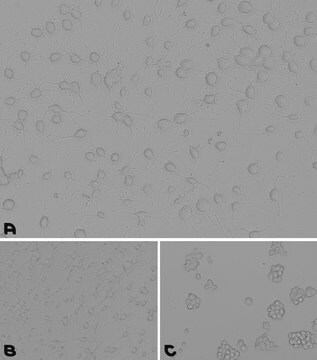CRISPRPL01
CRISPR GUS GAPDH Reporter Control for Monocots
About This Item
Recommended Products
recombinant
expressed in E. coli
Quality Level
packaging
vial of 50 μL
concentration
20 ng/μL in TE buffer; DNA (1μg of plasmid DNA)
application(s)
CRISPR
selection
kanamycin
shipped in
dry ice
storage temp.
−20°C
General description
CRISPR Plant Cas9 products are intended for Agrobacterium-mediated plant transformation. The products are based on the type IIA CRISPR-Cas9 derived from Streptococcus pyogenes. The native Cas9 coding sequence is codon optimized for expression in monocots and dicots, respectively. The monocot Cas9 constructs contain a monocot U6 promoter for sgRNA expression, and the dicot Cas9 constructs contain a dicot U6 promoter.
Arabidopsis seedlings were germinated in 6 well tissue culture plates. The seedlings were infected with Agrobacterium which had the CRISPR plasmids with a GUS reporter. After 3-4 days of transfection the GUS expression was detected. b-glucuronidase (GUS) is an enzyme that hydrolyzes colorless glucuronides to yield colored product
Application
- To verify successful integration of T-DNA in plant genome
- GUS receptor wheat gGAPDH control for monocots for Agrobacterium mediated transformation
Features and Benefits
- Low cost, genome editing option compared to other methods.
- Easy to use
- Online ordering
- Ready to ship in 2 days
Components
Keep reagent tubes closed when not in use.
Practice aseptic lab technique to avoid DNase contamination.
Principle
Other Notes
Legal Information
Storage Class Code
12 - Non Combustible Liquids
WGK
WGK 1
Flash Point(F)
Not applicable
Flash Point(C)
Not applicable
Certificates of Analysis (COA)
Search for Certificates of Analysis (COA) by entering the products Lot/Batch Number. Lot and Batch Numbers can be found on a product’s label following the words ‘Lot’ or ‘Batch’.
Already Own This Product?
Find documentation for the products that you have recently purchased in the Document Library.
Protocols
ZFNs and CRISPR/Cas9 advance targeted genome editing, opening new research avenues.
Related Content
Learn about our broad technology and reagent portfolios to help you with the discovery, development, and production phases of the plant breeding workflow, allowing you to develop and produce new crop varieties faster.
Explore technology and reagent portfolios for plant breeding workflows, accelerating the development of new crop varieties.
Our team of scientists has experience in all areas of research including Life Science, Material Science, Chemical Synthesis, Chromatography, Analytical and many others.
Contact Technical Service







